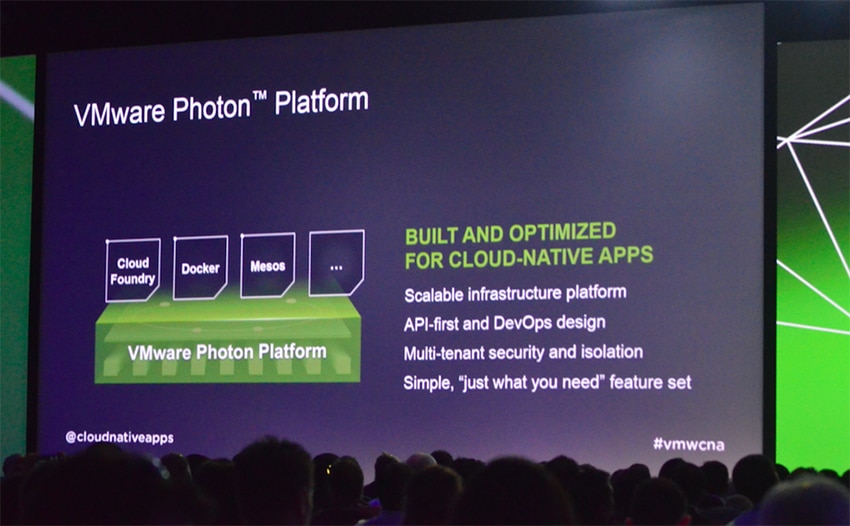VMware has unveiled VMware vSphere Integrated Containers and VMware Photon Platform, two new technology previews that enable enterprise IT operations teams to deliver containers in production on-premises and on VMware’s public cloud, VMware vCloud Air.

VMware vSphere Integrated Containers will allow IT teams to support any application, including containerized applications, on a common infrastructure. VMware indicates that the technology has the ability to accelerate container initiatives by giving IT teams the ability to leverage their existing investments in VMware infrastructure, people, processes and management tools. In addition, the new solution will give developers the flexibility, portability and speed containers deliver as well as the ability to easily integrate with other container ecosystem solutions such as CoreOS Tectonic, Docker, Kubernetes, Mesosphere’s Data Center Operating System and Cloud Foundry.
Using VMware vSphere, VMware claims that their new offering will help IT operations team meet the following enterprise requirements for containers:
- Security and Isolation – Assuring the integrity and authenticity of containers and their underlying infrastructure, Project Bonneville, a technology preview, isolates and starts up each container in a virtual machine with minimal overhead using the Instant Clone feature of VMware vSphere 6.
- Storage and Data Persistence – While many container services are stateless today, customers have the desire to enable stateful services to support cloud-native databases. VMware vSphere Integrated Containers will enable provisioning of persistent data volumes for containers in VMware vSphere environments. This will enable IT operations and development teams to take advantage of the speed and portability of containerized applications in conjunction with highly resilient VMware vSphere storage, including VMware Virtual SAN and VMware vSphere Virtual Volumes-enabled external storage.
- Networking –VMware NSX supports production container deployments today. With VMware NSX, IT can apply fine-grained network micro-segmentation and policy-based security to cloud-native applications. Additionally, VMware NSX provides IT with greater visibility into the behavior of containers. Finally, with VMware NSX, containers can be integrated with the rest of the data center, and can be connected to quarantine, forensics and/or monitoring networks for additional monitoring and troubleshooting.
- Service-Level Agreements (SLAs) – IT teams will be able to assure service-level agreements for container workloads with VMware vSphere Distributed Resource Scheduler as well as reduce planned and unplanned downtime with VMware vSphere High Availability and VMware vSphere vMotion.
- Management – Administrators will be able to use VMware vCenter Server to view and manage their containers without the need for new tools or additional training through Project Bonneville, which will enable the seamless integration of containers into VMware vSphere. Customers can further achieve consistent management and configuration compliance across private and public clouds using the VMware vRealize Suite.
VMware will also showcase and demonstrate the VMware Photon Platform at this week’s VMworld, a purpose-built solution designed to meet this emerging need and features in order to run cloud-native applications at scale. Designated as a technology preview, the VMware Photon Platform is ideal for DevOps teams looking to build out large pools of commodity computing capacity that solely run cloud-native applications. With it, DevOps teams will have the option of open container orchestration frameworks such as Docker Swarm, Kubernetes, Mesos and Cloud Foundry to run on the platform. WMware also indicates that this technology will support dynamic continuous integration environments, platform as a service (PaaS) or SaaS deployments, and sizable data analytics clusters running Hadoop or Spark.
The VMware Photon Platform features the following technologies:
- VMware Photon Controller – A multi-tenant, API-driven control plane optimized for scale, churn and high-availability. Automation-savvy DevOps teams will be able to speed the creation of thousands of new containers per minute and support hundreds of thousands of total simultaneous workloads. The controller will be released as an open source project to help encourage broad input, testing and adoption from customers, partners and the community at large. The technology will also incorporate Project Lightwave, which provides enterprise-grade trust and security for containers.
- VMware Photon Machine – This technology will include a new ESX Microvisor based on the proven core of VMware ESXi. It also includes Project Photon OS, a lightweight Linux operating system for containerized applications and optimized for VMware environments.
Also announced is VMware and Pivotal’s collaboration to offer solutions for cloud-native applications for IT operations and application development teams, respectively. The partnership will bring joint solutions to market, including a joint, turnkey offering that combines VMware Photon Platform and Pivotal Cloud Foundry solution to further accelerate the deployment, integration and management of a cloud-native application development and production stack.
Pricing and Availability
Both Project Lightwave and Project Photon OS are now available as an open source project on GitHub.
VMware Photon Controller is slated for a private beta release sometime in Q4 2015.




 Amazon
Amazon